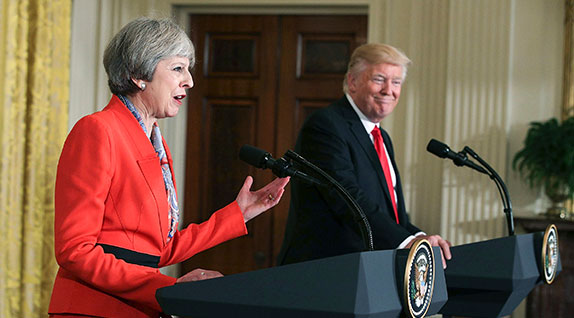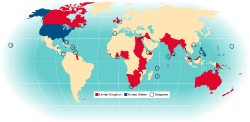 Alex Wong/Getty Images
Alex Wong/Getty Images
Article
Washington and London are rejuvenating their “special relationship” to ensure global prominence for their nations for years to come. Yet they are missing a crucial piece of the puzzle.
Learn the why behind the headlines.
Subscribe to the Real Truth for FREE news and analysis.
Subscribe NowOn January 27, Britain’s Prime Minister Theresa May became the first foreign head of state to meet with United States President Donald Trump.
A British head of state being first in line is unsurprising. A speech Mrs. May delivered before the meeting helps explain why.
Speaking to Republican lawmakers at a congressional retreat in Pennsylvania, she declared her resolve to continue Britain’s longstanding “special relationship” with America. In addition, she said that “the leadership provided by our two countries through this bond has done more than win wars and overcome adversity. It made the modern world.
“The institutions upon which that world relies were so often conceived or inspired by our two nations working together.”
She affirmed that it was both an honor and a privilege to “join hands as we pick up that mantle of leadership once more, to renew our special relationship and to recommit ourselves to the responsibility of leadership in the modern world.”
 Matt Cardy/AFP/Getty Images
Matt Cardy/AFP/Getty ImagesThe prime minister added that “a newly emboldened, confident America is good for the world. An America that is strong and prosperous at home is a nation that can lead abroad. But you cannot—and should not—do so alone. You have said that it is time for others to step up. And I agree.”
A day after this speech, during a joint news conference with President Trump at the White House, Mrs. May once again discussed this relationship: “…I am clear also that there are many issues on which the United Kingdom and the United States stand alongside one another; many issues on which we agree…we are at a moment now when we can build an even stronger special relationship which will be in the interest not just of the UK and the United States, but actually in the interest of the wider world as well.”
That statement echoed some of the ideas from her Pennsylvania speech: “So as we rediscover our confidence together—as you renew your nation just as we renew ours—we have the opportunity—indeed the responsibility—to renew the special relationship for this new age. We have the opportunity to lead, together, again.
“Because the world is passing through a period of change—and in response to that change we can either be passive bystanders, or we can take the opportunity once more to lead. And to lead together.”
Lead the world together. This is a bold statement. But is strengthening the “special relationship” enough to help the two nations remain global powerhouses?
Longstanding Relationship
Referring to America and Britain’s “special relationship” has become a tradition. It started with Sir Winston Churchill, who first used the term aside the phrase “fraternal association of the English-speaking peoples” to describe the friendship between the U.S. and UK during an address at Missouri’s Westminster College in 1946.
It was an emphasis on the unique bond Mr. Churchill’s country shared with the United States, realized just years prior as the two toiled in blood, sweat and tears to defeat Hitler’s Germany.
This was not only a working relationship, but a personal one. Time magazine reported that, during World War II, President Franklin Roosevelt and Mr. Churchill “exchanged 1,700 letters and cables between 1939 and 1945, with Roosevelt once telegraphing Churchill, in 1942, saying: ‘It is great fun to be in the same decade with you.’”
The U.S. lent its arm to Great Britain prior to formally entering the war. Through the Lend-Lease Act, military and financial assistance to the UK helped preserve the island nation—which for a time was the only standing opponent to the Axis powers after Paris fell to the Nazis.
 Popperfoto/AFP/Getty Images
Popperfoto/AFP/Getty ImagesThe bond solidified in the coming years as America and Britain became flagships of democracy against the Soviet march to spread communism throughout the world.
Whether at the height of the Cold War or the war on terror, each nation has been glued to the other’s side.
President Ronald Reagan and Prime Minister Margaret Thatcher evidenced this bond: “They shared the same ideological vision, presiding over historic free-market reforms in the 80s as they sought to end the Cold War,” Time reported.
The depth of this relationship was evidenced during Reagan’s funeral, during which Thatcher spread herself over the late president’s casket. Her biographer told NBC: “This was not play acting. She was devastated by his death, almost as much as she was by the death of her own husband.”
At the beginning of the war on terror, Prime Minister Tony Blair offered his unwavering support for President George W. Bush’s foreign policy. A 2002 report detailing Britain’s role in the Iraq War revealed that Mr. Blair wrote to Mr. Bush: “I will be with you, whatever.”
President Barack Obama remarked on the relationship between these peoples during a state dinner in Washington. With his British counterpart Prime Minister David Cameron present, Mr. Obama said: “We are by no means the first President and Prime Minister to celebrate the deep and abiding bonds between our people. There has been no shortage of words uttered about our special relationship.”
Further, Mr. Obama stated: “In war and in peace, in times of plenty and times of hardship, we stand tall and proud and strong, together. And as free peoples committed to the dignity of all human beings, we will never apologize for our way of life, nor waver in its defense.”
Mr. Cameron responded: “Like my predecessors, I’m proud of our essential relationship and of Britain’s strong national bond with the United States of America. I feel it in my bones.”
Marrow-deep sentiment is not just represented by the words of leaders. The peoples of these nations have seemingly always been intertwined.
 The Real Truth
The Real Truth“Historian Anthony Seldon, who is currently writing a book on the bond entitled Special, tells TIME that the two countries have been intimately bound together over the past century by shared history, government structures, ideals and defense cooperation,” Time reported.
Mr. Seldon told the magazine: “It is the norm to be close, and it happens because of the overlap of three set of factors: a common enemy, personal chemistry and common ideological outlook.”
Unpacking some of the terms used helps demonstrate the connection between these two nations.
“A common enemy.” Throughout large portions of the 20th and 21st centuries, Britain and the U.S. have aligned military efforts against common enemies. Think fascism, communism and terrorism.
While the relationship was a bit more rocky throughout the 18th and 19th centuries due to conflicts of interests, Britons and Americans generally favored each other. Even during the Revolutionary War and the War of 1812, public opinion of Americans by British and vice versa were positive.
President John Adams wrote in 1785 that King George III said to him after the revolution, “…the Separation having been made and having become inevitable, I have always said, as I say now, that I would be the first to meet the Friendship of the United States as an independent Power” (The National Archives).
According to Adams, the king also stated, “…let the circumstances of Language; Religion and Blood have their natural and full Effect.”
Historians consider the king’s cool reaction as unusually low-key after just having lost the British Empire’s largest and most prosperous colony up until that point. Keep in mind that the colonies were under the British crown since the early 1600s.
Today, British-American defense cooperation is the most comprehensive in the world. Mrs. May stated during the joint conference at the White House that “the UK-U.S. defense relationship is the broadest, deepest and most advanced of any two countries—sharing military hardware and expertise.”
“Personal chemistry.” The British and American peoples share many characteristics: the English language, similar religious values, and a rich, vibrant culture.
As such, they have often had similar tastes, despite their differences. For example, the two nations shared an interest in pop music during the 20th century. They put forward musicians that took the world by storm, with such mega-selling acts as Frank Sinatra, The Beatles, and Elvis Presley.
And curiously, they seem to enjoy each other’s entertainment the most. As one person commented on a Quora discussion board: “We listen to each other’s music (Jimi Hendrix [in the] UK, Beatles [in the] US), and remake each other’s TV shows (The Office, House of Cards).”
Today, American and British recording labels dominate the global music industry. The “Big Three,” American-based companies Universal Music Group and Warner Music Group, as well as Sony Music Entertainment, which owns the UK-based EMI Group, control over 88 percent of the market.
The two cultures have together valued creativity, expression and satire. Another commenter on a Quora discussion stated: “since there is linguistic affinity, both cultures tend to like puns…you don’t come across puns often, compared to English.”
“Common ideological outlook.” The United States and the United Kingdom share a seemingly inherent desire to spread democracy and all of its values—individualism, capitalism and human rights. They have sought to herald such liberties not only for their own citizens, but also for all nations.
Interestingly, this common drive for expansion has also been the cause of tense conflicts. During the dispute over the Oregon boundary from 1844 to 1846, overlapping British and American claims to land nearly drove the two to war.
The British middle class, however, felt the dispute should be settled without bloodshed, as they purported a unique bond with Americans due to language, migration, evangelicalism and extensive trade. This moved London to appease Washington and settle on a peaceful resolution.
While there have been tensions over the years—some continue today—their relationship remains unique. Many of the conflicts have been because the two are such global powers that they frequently butt up against one other. They are like brothers, each trying to one-up the other. Yes, there are familial squabbles, but they always find a way to get along.
What two nations on Earth, completely independent from each other and separated by an ocean, share such a unique bond?
In addition, what has helped these countries to grow together? The answer can help one not only understand why they have nurtured this special relationship—but also how they have achieved astonishing results.
Leaders of the World
When Prime Minister May speaks of leading the world together again, it is not a statement pulled from a hat.
For two centuries, Great Britain ruled the world. At its peak, it controlled nearly one-quarter of the world population and held 11 million square miles of territory spanning the globe, leading to its slogan: “The sun never sets on the British Empire.”
To govern such a vast amount of territory, the empire commanded one of the most powerful naval forces in history.
After the first world war, the United States effectively overtook Great Britain as a military force, and has risen ever since. America allocates about $600 billion per year toward defense—by far the most of any nation. In addition, the U.S. Navy is the only naval force that possesses 10 operational aircraft carriers. Only six other nations have even one, at most two.
Also consider that America has over 40 allies bound by formal treaties, including most members of the world’s largest economies.
Together, at their heights of power, London and Washington had control over many of the world’s most coveted sea gates including the Suez and Panama canals, straits of Gibraltar and Hormuz, Singapore, Cape Horn, Malta, Cape of Good Hope, Hong Kong, Hawaii and the Philippines. This contributed to their great military prowess and their status as economic leaders of the world.
On top of that, two of the most well-known financial capitals of the world are New York City and London. Not only are these centers the means through which the world conducts its trade, they are major partners with each other.
Mrs. May stated during the White House press conference: “The U.S. is the single biggest source of inward investment to the UK, and together [we have] around one trillion dollars invested in each other’s economies.”
Such dizzying prosperity has been the envy of the world.
Years ago, British imperialism prompted others to attempt to expand their spheres of influence, including Germany, Spain and France. Yet these nations came nowhere near controlling one-quarter of the Earth, never mind securing the most valuable of these lands for natural resources (e.g., Canada, South Africa, India).
The success of America’s revolt from Great Britain spurred nations around the world to pursue independence. Yet after gaining autonomy, many of those nations, including Haiti, Brazil, Argentina and Greece, never went on to experience the kind of prestige and influence that America has had.
Put all of this together: These two nations have had the greatest armies, been world leaders in agriculture, manufacturing, production, technology and trade, and held crucial strategic sea gates and defensive strongholds throughout the world. And though both nations have been repeatedly challenged, both have almost always emerged victorious.
All By Chance?
The why behind America and Britain’s meteoric rise is one of the greatest questions of world history. Was it chance?
Jared Diamond, a professor of geography, attempted to answer a similar question in his Pulitzer Prize-winning book Guns, Germs, and Steel. He asked, “Why did wealth and power become distributed as they now are, rather than in some other way?” Also, “Why did human development proceed at such different rates on different continents?”
An overly simplified version of his answer is that it was all by chance. The peoples that just happened to be in the right place at the right time grew into global powerhouses.
His research showed that peoples who originated in the Fertile Crescent—which was home to many hearty farm crops—have a particular leg up. (Regular readers of The Real Truth know the ancestors of Americans and Britons are among these peoples as many from this region moved to Europe and even further westward.)
Dr. Diamond pointed out that farming and animal husbandry allowed villagers to put their time into advancing technology rather than spending their days hunting and gathering food.
Also, living and working with domesticated animals builds up humans’ immune systems. Those in the Fertile Crescent had the big four: cows, pigs, goats and sheep.
This was not the case for most of the rest of the world. No large livestock originated in Indonesia, Australia and Sub-Saharan Africa. South America? Just the humble llama. Europe and China had a few, but none of the big four.
According to Dr. Diamond, lack of animal domestication is why many Incans and Aztecs died from disease when the Spanish conquistadors arrived in Central and South America.
From a scholarly standpoint, it appears the U.S. and the UK were simply mega-millionaire winners in the lottery of life. Yet this does not even begin to tell the whole story.
Deep Roots
While there are always pushes to secularize the U.S., it has undeniable Judeo-Christian ties. Consider America’s biblical roots—found on its currency (“In God We Trust”), in the Pledge of Allegiance (“under God”), and sprinkled throughout laws (for example, bankruptcy regulations borrow from the seventh year of release found in Deuteronomy 15). It is also evidenced by the countless churches throughout the nation.
Britain is similar. Connections to the Old Testament and ancient Israel are littered through its cultural heritage—its music in particular.
One popular song titled “Jerusalem” muses about a non-biblical legend of a young Jesus Christ coming to visit Britain with Joseph of Arimathea: “And did those feet in ancient time, walk upon England’s mountains green?”
Based on a poem by William Blake, the words indicate a desire to build a city of peace in England: “I will not cease from Mental Fight…Till we have built Jerusalem, in England’s green and pleasant Land.”
There is also the Welsh hymn “Bread of Heaven.” A literal translation of the lyrics reveals it is about ancient Israel traveling to the Promised Land. It asks God to “guide me through the wilderness,” “give me manna,” and provide drink from “the sweet springs which gush forth from the rock.” Another translation calls this “the Rock that is.”
These two hymns are often sung at royal weddings and funerals—and even sporting events. There has even been a campaign to have “Jerusalem” replace “God Save the Queen” as Great Britain’s national anthem.
Yet why are these two nations so tied to the Bible? The very Book holds the answer.
Even Deeper
The Bible makes plain why America and Britain rose to great heights. In the Old Testament, the Creator bestowed a special blessing upon the patriarch Abraham for his obedience. This decree passed to his son Isaac, then Jacob, who was told his descendants would become “a nation and a company of nations” (Gen. 35:11).
This birthright blessing was then passed to Jacob’s grandsons Ephraim and Manasseh, the sons of Joseph. It was this pair of brothers that would later emerge to become the single-greatest nation and biggest-ever company of nations of all time: the United States of America and the British Empire.
Ask yourself: What other pair of related nations have become the single greatest nation of all time and the single greatest empire of all time?
The answer is obvious. Also, you now know why Britain and the U.S. have a special relationship—they are brothers!
Yet history and the Bible provide even more proof. Notice what God told Abraham: “That in blessing I will bless you, and in multiplying I will multiply your seed as the stars of the heaven, and as the sand which is upon the sea shore; and your seed shall possess the gate [sea gates!] of his enemies; and in your seed shall all the nations of the earth be blessed; because you have obeyed My voice” (Gen. 22:17-18).
Jacob was told: “Therefore God give you of the dew of heaven, and the [fertile places] of the earth, and plenty of corn and wine” (27:28).
Think of the abundance both the U.S. and UK enjoy!
There is a problem, though. While some in these nations do acknowledge that God has blessed them, most think it is by their own might and power that these brother nations rose to prominence. Worse, few in either group will do what Abraham did—obey.
God knows this is part of human nature. Notice what He warned in Deuteronomy 8: “Beware that you forget not the Lord your God, in not keeping His commandments, and His judgments, and His statutes…Lest when you have eaten and are full, and have built goodly houses, and dwelt therein; and when your herds and your flocks multiply, and your silver and your gold is multiplied, and all that you have is multiplied; then your heart be lifted up, and you forget the Lord your God…” (vs. 11-14).
As a whole, the Anglo-Saxon peoples have “eaten and are full,” they “have built goodly houses,” and their “herds,” “flocks,” “silver” and “gold” have multiplied beyond imagination.
The result is exactly what God said it would be. We as nations have forgotten Him. We have not kept His commandments, judgments and statutes.
But here is the irony: America and Britain think God’s blessings will continue indefinitely. Yet they are solely due to promises made to a faithful man thousands of years ago—and will not last forever.
If these fraternal nations truly want to lead the world as they advance into the future, they must recognize where their prominence comes from and wholeheartedly submit to the Being who brought it about in the first place.
To learn more of the Bible’s story about the U.S. and UK—and what the next few years will bring—read David C. Pack’s eye-opening book America and Britain in Prophecy.


